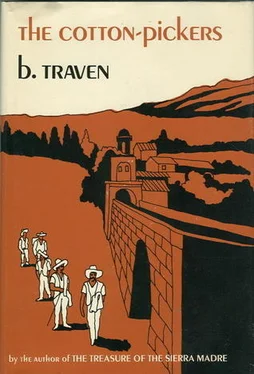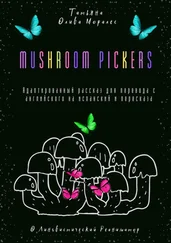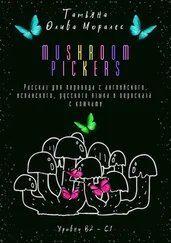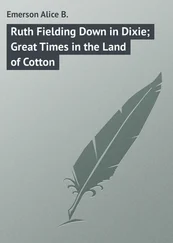B. Traven - The Cotton-Pickers
Здесь есть возможность читать онлайн «B. Traven - The Cotton-Pickers» весь текст электронной книги совершенно бесплатно (целиком полную версию без сокращений). В некоторых случаях можно слушать аудио, скачать через торрент в формате fb2 и присутствует краткое содержание. Год выпуска: 1969, Издательство: Hill and Wang, Жанр: Проза, на английском языке. Описание произведения, (предисловие) а так же отзывы посетителей доступны на портале библиотеки ЛибКат.
- Название:The Cotton-Pickers
- Автор:
- Издательство:Hill and Wang
- Жанр:
- Год:1969
- ISBN:нет данных
- Рейтинг книги:3 / 5. Голосов: 1
-
Избранное:Добавить в избранное
- Отзывы:
-
Ваша оценка:
- 60
- 1
- 2
- 3
- 4
- 5
The Cotton-Pickers: краткое содержание, описание и аннотация
Предлагаем к чтению аннотацию, описание, краткое содержание или предисловие (зависит от того, что написал сам автор книги «The Cotton-Pickers»). Если вы не нашли необходимую информацию о книге — напишите в комментариях, мы постараемся отыскать её.
—Book World
The Cotton-Pickers — читать онлайн бесплатно полную книгу (весь текст) целиком
Ниже представлен текст книги, разбитый по страницам. Система сохранения места последней прочитанной страницы, позволяет с удобством читать онлайн бесплатно книгу «The Cotton-Pickers», без необходимости каждый раз заново искать на чём Вы остановились. Поставьте закладку, и сможете в любой момент перейти на страницу, на которой закончили чтение.
Интервал:
Закладка:
But when I was sitting by my fire, wondering what thing it could have been, a strange idea came to me: Someone had hanged himself in the house, some time ago; the rope had rotted or the neck had putrefied, and my striking at the wall had shaken the body, so that the corpse had fallen. It had sounded as if a human body had toppled over and the head had struck the floor.
But of course this idea was ridiculous. It only showed where
your imagination could lead you if you shied away from looking at the facts. When you’re in this state of mind, a tree trunk in the field could be a bandit waiting in ambush. Besides, in the tropics nobody would hang himself. In this part of the world suicide is rare; no day is gray enough for it. And if someone really did want to do it, why, he’d go into the bush where within three days the only part of him that would still be recognizable would be the buckle of his belt.
Whenever I went to get water I made a point of not looking into the house; I even avoided looking for any chink through which I could peep. The vague, the mysterious meant more to me than a possibly prosaic explanation. But when I sat by the fire in the evening or lay awake at night, my thoughts would turn to what might be inside the house.
On Saturday I went to Mr. Shine and asked if there’d been any message from the oil camp. But Mr. Shine hadn’t gone to the store all week, and wouldn’t be going the following week either. As Monday was the first of the month and the driller whose place I was to take could be starting his vacation then, I decided to go down to the store myself on Sunday morning. I would take my bundle with me and be ready to start off at once if word had come through. That way I could be in the camp on Sunday afternoon. If there was no message I’d know that the driller was either not going on vacation or that he’d made some other arrangement. In that case I’d continue on to the station and simply carry out my plan of going to Guatemala.
Early Sunday morning I went to get water for my coffee. I’d got the water and was already past the house when I decided that, after all, I’d go inside and see what there was to see. If I didn’t, the thought of it would probably plague me for months to come.
I climbed the few rungs of the ladder and pushed open the door. Something was lying by the wall to my right — a large bundle. I couldn’t see what it was right away, in the dawn light.
I stepped over to it. It was a man. Dead!
It was Gonzalo.
Gonzalo, dead.
Murdered!
His ragged shirt was black with dried blood. A ball of cotton, crumpled in his right hand, was likewise caked with blood. He had a stab in the back, and further stabs in the chest, the right shoulder, and the left arm.
Obviously the body had been propped up against the wall; when I had struck, it had fallen sideways and the head had hit the floor.
I searched his pockets — five pesos and eighty-five centavos. He should have had at least twenty-five to thirty pesos.
So it had been for the money.
A little canvas tobacco pouch lay open beside him. There were a few corn husks on the floor. He had been attacked while rolling himself a cigarette right there where he now lay.
The Chink and Antonio had been the last to leave the house. The Chink wasn’t the murderer. He wouldn’t so much as touch anyone for the sake of twenty pesos; he was far too clever for that. Those twenty pesos would have cost too dear for the Chink.
Antonio then.
I’d never have thought it of him.
I put the money back into Gonzalo’s pocket and left him where he lay.
Then I wedged the door into position as I’d found it and left the house.
I gave up the idea of making coffee and set off at once. I went to Mr. Shine and told him that I was going to the store, and that if there was nothing doing at the oil camp I’d continue on my way.
“Didn’t you feel lonely in your airy apartment, Gales?” he asked.
“No,” I said. “There was so much to see and so many things to watch that the time passed very quickly.”
“I thought you might have moved into the house. After all, it is a house.”
“I told you when I came back from the oil field that it was swarming with mosquitoes.”
“My two nephews are coming on a visit at New Year’s. It’ll be a holiday for them. I’ll put them in there, and they can do as they like. They can make a start by smoking out the mosquitoes. Well, Gales, good luck to you!”
We shook hands and off I went.
Why should I have said anything? No one would think that I was the murderer, for hadn’t I left before all the other fellows and been working at the oil camp all the time? If I had said something about it, there would have been endless questions and comings and goings and who knows what else, and I should never have been able to get to the oil field in time.
8
I was paid off when the driller returned from his vacation. One of the trucks took me to the station and from there I traveled on to a small town on the coast. I didn’t stop long but went straight on to the next sizable town so that, provided I didn’t change my plans again, I could get to Guatemala within a few days.
While I was in town I wanted to keep my ear to the ground and find out how things were in the south, whether there was anything behind the rumors of new oil fields, what the chances of employment were or whether I wouldn’t do better to make tracks for the Argentine. But I heard too much about the mass unemployment down there. Ghastly stories I heard. Eighty thousand in the gutter in Buenos Aires alone, just looking for a chance to get out of there. Anyhow, it couldn’t be worse than it was in Mexico.
I went over to the park and sat around on a bench. I had a shoe shine, drank a glass of ice water, and, feeling at peace with myself and all the world, was just about to take a siesta when I noticed that an acquaintance was sitting on a bench opposite me.
I went over to him. “Hello, Antonio,” I said. “How are you? What are you doing here?”
We shook hands. He was very pleased to see me. I sat down beside him and told him that I was looking for a job.
“That’s fine. I’ve been working in a bakery here for two weeks, baking bread and cakes. You could start in right away; they’re looking for an assistant. You ever worked as a baker?”
“No. I’ve had a hundred different jobs, I’ve even been a camel drover — and what a goddamned job that is — but I’ve never been a baker.”
“Fine!” said Antonio. “In that case you’ll be all right. If you really were a baker or knew anything about baking, it’d be no good. The owner’s a Frenchman; he knows nothing about baking. If you tell him that pepper’ll improve the loaf, he’ll believe you. Of course he’ll ask you if you’re a baker and you must tell him without batting an eyelash that you’ve been in the trade ever since you were a boy. The master baker is a Dane, a ship’s cook who jumped ship. He knows nothing about baking, either. His worry is that some day someone who really knows something about baking will get a job there. That would be the end of the Dane and his master-baking. Yes, a real baker would size him up in less than ten minutes. So if the master asks you anything, you say the very opposite of what you say to the owner. Get the idea? You must tell the master baker that it’s the first time in all your life you’ve seen the inside of a bakery. Then he’ll take you on at once and be quite chummy with you.”
“I can play that game,” I said. “What’s the pay?”
“One twenty-five a day.”
“Bare?”
“Don’t make me laugh. With room and board. Soap is free, too. By all means it’s better than cotton-picking, I can tell you.”
Читать дальшеИнтервал:
Закладка:
Похожие книги на «The Cotton-Pickers»
Представляем Вашему вниманию похожие книги на «The Cotton-Pickers» списком для выбора. Мы отобрали схожую по названию и смыслу литературу в надежде предоставить читателям больше вариантов отыскать новые, интересные, ещё непрочитанные произведения.
Обсуждение, отзывы о книге «The Cotton-Pickers» и просто собственные мнения читателей. Оставьте ваши комментарии, напишите, что Вы думаете о произведении, его смысле или главных героях. Укажите что конкретно понравилось, а что нет, и почему Вы так считаете.











